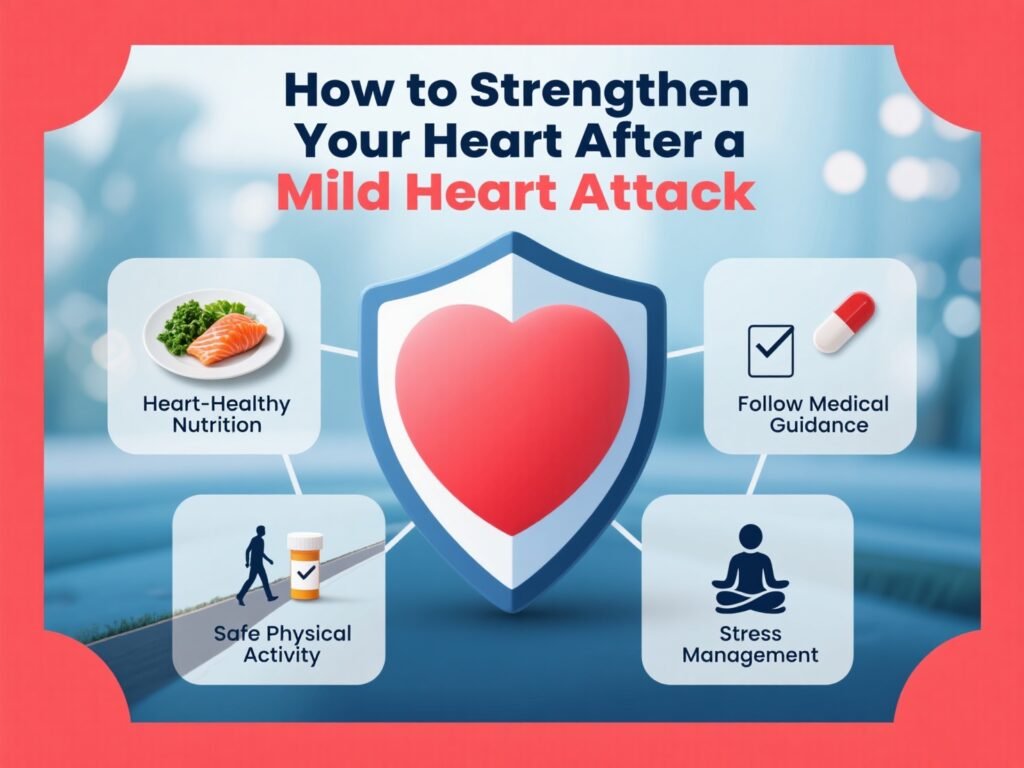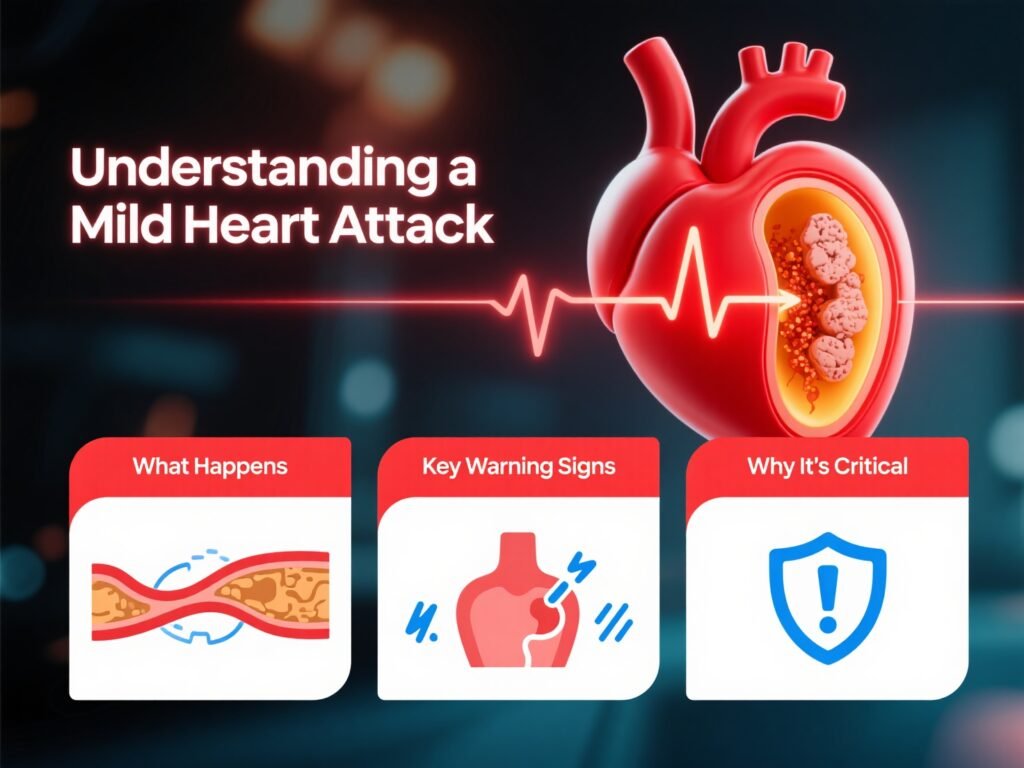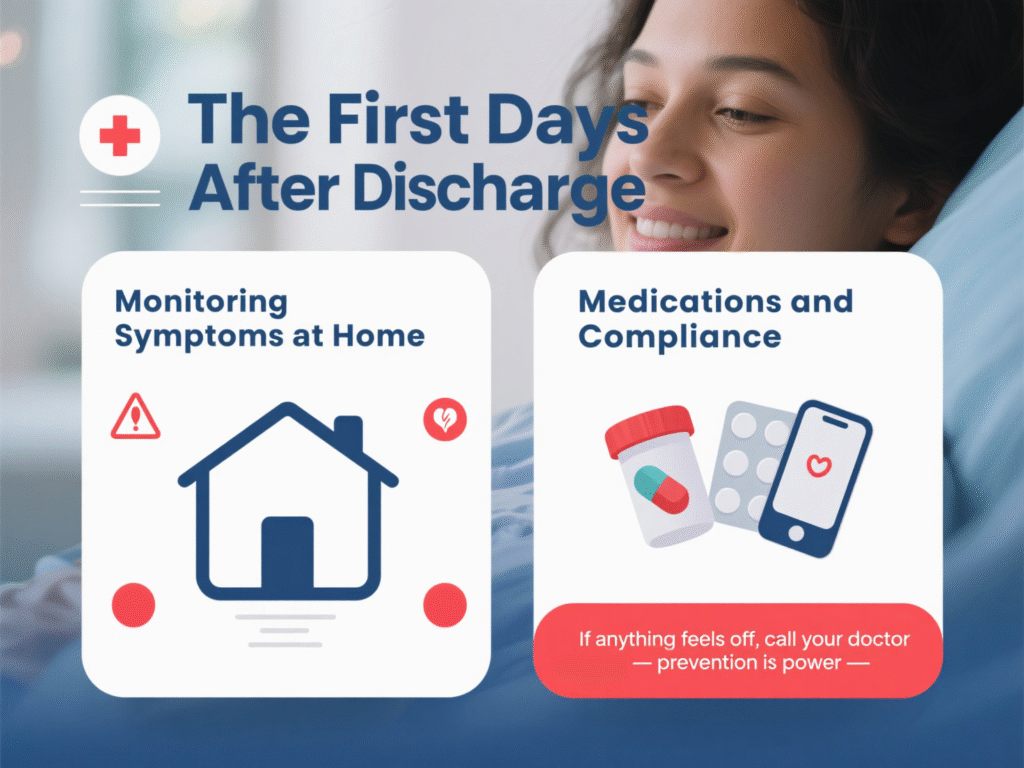How to Strengthen Your Heart After a Mild Heart Attack

A mild heart attack may not knock you off your feet, but it should definitely shake you into action. Think of it as a gentle warning from your heart—time to tune up your lifestyle and start treating your health like a priority. In this guide, we walk you through everything you need to know to strengthen your heart after a mild heart attack, with natural tips, professional guidance, and real-life strategies.
Understanding a Mild Heart Attack

What Makes It “Mild”?
A mild heart attack, often referred to as a non-ST elevation myocardial infarction (NSTEMI), is still a heart attack, just with less severe damage. It usually means that only a part of the heart muscle was affected, and blood flow wasn’t entirely blocked. That might sound “less scary,” but any heart attack is a big deal.
Why You Should Still Take It Seriously
Think of it like a warning light on your car dashboard. Just because the engine didn’t explode doesn’t mean you ignore the problem. A mild heart attack is a sign that your arteries may be clogged, your blood pressure too high, or your lifestyle too risky.
For expert care and check-ups, consider visiting Northern Heart Hospital, where specialists help you recover safely and build a healthier future.
The First Days After Discharge

Monitoring Symptoms at Home
After you’re discharged from the hospital, your first mission is rest and observation. Pay close attention to:
- Chest pain or pressure
- Shortness of breath
- Dizziness or fainting
- Fatigue that worsens
If anything feels “off,” do not hesitate to call your doctor. Prevention is power.
Medications and Compliance
Doctors often prescribe medications to prevent future heart issues—these might include beta-blockers, statins, ACE inhibitors, or blood thinners. Never skip them. Always follow the timing, dosage, and guidelines.
Keep a log, set phone reminders, or even use a pill organizer. Your heart will thank you.
Building a Heart-Healthy Lifestyle
Diet: Fueling Your Heart the Right Way
Food is fuel, but not all fuels are created equal. Your heart loves a clean, balanced diet.
Best Foods for Heart Recovery
- Leafy greens like spinach and kale
- Oats, barley, and other whole grains
- Fatty fish such as salmon or mackerel
- Nuts, especially walnuts and almonds
- Berries and antioxidant-rich fruits
Foods to Avoid After a Heart Attack
- Trans fats (think packaged snacks)
- Sugary drinks
- Excessive salt
- Fried or processed meats
To learn more about heart-smart nutrition, check out Northern Heart Hospital’s resources and professional dietary services.
Physical Activity and Movement
When and How to Start Exercising Safely
Start slow. Gentle walking, stretching, and breathing exercises are good in the first few weeks. After medical clearance, begin increasing intensity under supervision.
Warning Signs to Pause or Stop
Stop immediately if you feel:
- Chest discomfort
- Irregular heartbeat
- Light-headedness
- Unusual fatigue
Listen to your body—it’s wiser than you think.
Stress and Emotional Health
Managing Anxiety After a Heart Attack
It’s totally normal to feel anxious after a cardiac event. You’re not alone. Journaling, meditation, and speaking to a counselor can help ease your mental load.
The Importance of Social Support
Surround yourself with people who care—friends, family, or support groups. Emotional healing is just as critical as physical recovery.
Cardiac Rehabilitation Programs
What to Expect from Cardiac Rehab
Cardiac rehab isn’t just for severe heart attacks. It offers a structured, medically supervised program to help you:
- Improve fitness
- Learn healthy habits
- Reduce stress
- Prevent future events
Many programs even include dietitians and psychologists.
Finding a Program Near You
If you’re in Malaysia, explore Northern Heart Hospital’s cardiac rehab services. With personalized care plans, their team ensures that you regain strength—safely and confidently.
Meet the Experts at Northern Heart Hospital
At Northern Heart Hospital, you’ll find a team of professionals who go beyond routine care. Their multidisciplinary approach includes cardiologists, rehabilitation specialists, dietitians, and fitness coaches. Whether you need help adjusting medications or building a safe workout routine, their experts guide you every step of the way.
Final Thoughts
Your heart gave you a wake-up call—now it’s your move. With small, consistent steps, you can regain your strength, rebuild your confidence, and prevent future heart issues. Start with the basics: take your medications, eat smart, move daily, and lean on the experts at Northern Heart Hospital for guidance. Your comeback story begins now.
FAQs
1. Can I return to work after a mild heart attack?
Yes, many people return to work within a few weeks. It depends on your health, type of job, and your doctor’s advice.
2. Are supplements like omega-3s safe after a heart attack?
They can be beneficial, but always consult your doctor before starting any supplement.
3. How long should I stay in cardiac rehab?
Most programs last 6 to 12 weeks, but it can vary based on your progress and health goals.
4. Will I need surgery after a mild heart attack?
Not necessarily. Many mild cases are managed with medications, lifestyle changes, and monitoring. However, it is still worthwhile to undergo Coronary Angiogram and subsequent revascularisation therapy (Angioplasty or Bypass Surgery) if the blockage is critical.
5. Is emotional stress as dangerous as physical factors?
Absolutely. Chronic stress and anxiety can increase your risk of another heart event. Managing both is key to full recovery. Medication has been found to be useful in reducing the stress level and improve clinical outcome.
